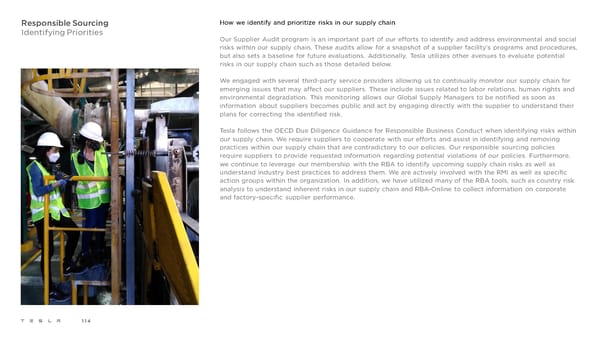Responsible Sourcing How we identify and prioritize risks in our supply chain Identifying Priorities Our Supplier Audit program is an important part of our efforts to identify and address environmental and social risks within our supply chain. These audits allow for a snapshot of a supplier facility’s programs and procedures, but also sets a baseline for future evaluations. Additionally, Tesla utilizes other avenues to evaluate potential risks in our supply chain such as those detailed below. We engaged with several third-party service providers allowing us to continually monitor our supply chain for emerging issues that may affect our suppliers. These include issues related to labor relations, human rights and environmental degradation. This monitoring allows our Global Supply Managers to be notified as soon as information about suppliers becomes public and act by engaging directly with the supplier to understand their plans for correcting the identified risk. Tesla follows the OECD Due Diligence Guidance for Responsible Business Conduct when identifying risks within our supply chain. We require suppliers to cooperate with our efforts and assist in identifying and removing practices within our supply chain that are contradictory to our policies. Our responsible sourcing policies require suppliers to provide requested information regarding potential violations of our policies. Furthermore, we continue to leverage our membership with the RBA to identify upcoming supply chain risks as well as understand industry best practices to address them. We are actively involved with the RMI as well as specific action groups within the organization. In addition, we have utilized many of the RBA tools, such as country risk analysis to understand inherent risks in our supply chain and RBA-Online to collect information on corporate and factory-specific supplier performance. 114
 Tesla 2021 Impact Report Page 113 Page 115
Tesla 2021 Impact Report Page 113 Page 115